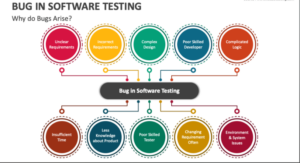Introduction
Software testing jobs offer a wide range of opportunities, catering to different skill levels, interests, and specializations. Whether you’re just starting out or have years of experience, the field of software testing has a structured and rewarding growth trajectory.
With the rise of Agile methodologies, DevOps, and automation, testers now play a crucial role in ensuring the quality and performance of applications. This dynamic field offers paths from manual testing to advanced automation, performance, security, and even leadership roles such as Test Lead or QA Manager. Understanding the software testing job landscape helps aspiring software testers navigate their growth and make informed decisions for professional advancement.
Creating a career path in software testing involves understanding the various roles and responsibilities associated with this field, as well as the skills and certifications that can enhance one’s job prospects and growth. Enrolling in QA testing classes can be a crucial step in building the technical knowledge and practical skills needed to succeed in this dynamic field. Here’s a comprehensive guide to help you navigate through the career path in software testing.
Software Testing
Software testing is an essential component of the software development lifecycle (SDLC). It involves the process of verifying and validating that a software application or program meets the technical and business requirements that guided its design and development. Software testing jobs play a crucial role in preventing defects, reducing development costs, and ensuring that software is functional and user-friendly.
How to Be a Good Software Tester?
Becoming a good software tester involves a combination of technical acumen, meticulous attention to detail, and strong analytical skills. Here are key attributes and practices that can help you excel in this role:
- Thorough Understanding of Software Lifecycle: A good tester has a deep understanding of the software development lifecycle (SDLC) and the various testing phases. Knowledge of methodologies like Agile and DevOps is also crucial, as these are commonly used in modern development environments.
- Strong Technical Skills: Proficiency in testing tools and technologies is essential. This includes mastering test management software, defect tracking tools, and automation tools. Learning programming languages such as Python Java, or JavaScript can also enhance your ability to write and understand test scripts.
- Analytical and Problem-Solving Skills: Excellent analytical skills enable a tester to break down complex software systems and identify potential areas of weakness. Problem-solving is crucial for effectively identifying, isolating, and reporting issues.
- Detail-Oriented Mindset: Attention to detail is critical in testing. Meticulousness ensures that no defect, no matter how minor, is overlooked.
- Effective Communication Skills: A tester must effectively communicate findings, bugs, and suggestions to developers and other stakeholders. Clear communication helps prevent misunderstandings and ensures that issues are promptly and properly addressed.
- Continuous Learning and Adaptability: The tech field is constantly evolving, so staying updated with the latest testing trends, tools, and technologies is vital. Adapting to new tools and methods can significantly enhance testing efficiency and effectiveness.
By cultivating these skills and attributes, you can become a proficient software tester, contributing significantly to the development of high-quality software products.
Entry-Level Positions
1. QA Analyst/Tester
Starting a career in software testing typically begins with an entry-level position such as a QA Analyst or Tester. These professionals are responsible for running various tests on new software products to ensure they behave as expected by executing test cases and reporting any bugs or issues.
Responsibilities:
- Developing and executing software test plans
- Identifying and recording bugs and inconsistencies
- Collaborating with software developers to resolve issues
Skills Required:
- Understanding of basic testing principles
- Familiarity with software development lifecycle (SDLC)
- Basic programming knowledge
Mid-Level Positions
2. QA Engineer
After gaining some experience, testers might advance to a QA Engineer role. QA Engineers have a deeper involvement in the creation and execution of test cases and often automate them to improve testing efficiency.
Responsibilities:
- Designing, developing, and executing automation scripts
- Integrating automation testing into the CI/CD pipeline
- Maintaining and enhancing test automation frameworks
Skills Required:
- Proficiency in scripting and automation tools such as Selenium, QTP, or TestComplete
- Strong analytical and problem-solving skills
- Experience with continuous integration tools
3. QA Lead/Manager
With further experience and expertise, QA professionals can move into leadership positions such as QA Lead or QA Manager. These roles involve overseeing a team of testers, managing projects, and ensuring the quality of the final product.
Responsibilities:
- Leading QA teams in test planning and execution
- Managing project timelines and resources
- Ensuring compliance with industry standards
Skills Required:
- Strong leadership and communication skills
- Advanced knowledge of project management principles
- Ability to mentor and motivate team members
Advanced Positions
4. Test Architect
A Test Architect is a strategic role that involves planning and designing the test environment and frameworks, especially for large and complex software systems.
Responsibilities:
- Developing test strategies for complex systems
- Designing test frameworks and infrastructures
- Evaluating and implementing advanced testing tools and processes
Skills Required:
- In-depth understanding of software architecture
- Expertise in multiple testing domains (e.g., performance, security)
- Innovative thinking and strategic planning capabilities
5. Director of Quality Assurance
At the pinnacle of a QA career, one might become the Director of Quality Assurance. This executive-level position focuses on setting the overall quality standards for software and systems at an organizational level.
Responsibilities:
- Defining quality policies and procedures
- Overseeing multiple QA teams and projects
- Aligning quality assurance strategies with business objectives
Skills Required:
- Extensive leadership experience
- Comprehensive knowledge of industry standards and regulations
- Strong organizational and decision-making skills
Continuous Learning and Certification
To advance in a software testing career, professionals must continuously update their skills and knowledge. Certifications like ISTQB (International Software Testing Qualifications Board) and CSTE (Certified Software Tester) can be valuable. Participating in workshops, webinars, and other training sessions is also beneficial for those seeking software testing jobs and aiming for career growth.
The career path in software testing is diverse and offers numerous opportunities for growth and specialization. Whether starting as a Software testing job or advancing to a Director of Quality Assurance, success in this field requires a commitment to learning and adapting to new technologies and methodologies. With the right skills and dedication, a career in software testing can be fulfilling and rewarding, offering a unique blend of technical challenges and creative problem-solving.
As being the monotonous test case executor, several career options have evolved in front the testing community. The software testing job options available in testing tools are enormous. It has functional testing tools, performance testing tools and security testing tools other than the management tools like quality center from micro focus (earlier HP), CQTM from IBM. The demand for niche skills like SOA testers (service oriented architecture), security testers are increasing.
We require large skill in automation areas, skills in scripting languages like VB, Java, Perl, shell and python etc. Technical resources should have capabilities to check the automation tools and create the automation framework and the reusable components which are on demand. There is always a good demand for good performance testers who can identify the bottlenecks and give suggestions on tuning techniques. Automation testing tools knowledge: There is a demand for automation and performance testers. They need well equipped knowledge on validation, creation and enhancement in automation test framework.
Software Testing job
A software testing job involves evaluating software applications to ensure they function as intended and are free of defects. Testers play a critical role in the software development lifecycle, meticulously analyzing software to detect bugs, verify functionality, and ensure that the user requirements are met before the product goes to market.
This role requires a blend of technical skills, including knowledge of testing methodologies like Agile and Waterfall, proficiency with testing tools, and sometimes programming skills for automation. Effective communication and a detail-oriented mindset are also essential as testers must collaborate with developers and other stakeholders to ensure software quality and performance. Software testing jobs offer a pathway to advancement into roles such as QA Analyst, Automation Engineer, and Test Manager.
software testing career growth path explained
The career path in Software testing job offers numerous opportunities for growth, starting from entry-level positions such as QA Analyst or Tester, where the focus is on executing test cases and identifying bugs. With experience, one can advance to roles like QA Engineer, who are involved in developing and automating test cases, enhancing efficiency and coverage.
Leadership roles such as QA Lead or Manager follow, where the responsibilities expand to overseeing teams, managing projects, and ensuring adherence to quality standards. These software testing jobs provide the opportunity to lead teams and influence testing processes at a higher level.Continuous learning, gaining certifications like ISTQB, and adapting to new technologies are crucial for advancing in this field, making it a dynamic and rewarding career choice for tech enthusiasts.
software testing certifications in demand
Software testing certifications are crucial in validating a tester’s expertise and proficiency in the field. Among the most in-demand certifications that help professionals stand out in the competitive tech industry are:
- ISTQB Certified Tester: Offered at Foundation, Advanced, and Expert levels, the ISTQB certification is globally recognized. It covers fundamentals, advanced testing techniques, and specialized areas like test automation and security testing.
- Certified Software Test Engineer (CSTE): This certification is for those looking to showcase their understanding of software testing principles and best practices. It emphasizes quality control, planning, execution, and management of testing projects.
- Certified Software Quality Analyst (CSQA): Aimed at software quality professionals, the CSQA certification focuses on quality assurance and quality control, including methodologies, management, and processes.
- Certified Manager of Software Testing (CMST): Ideal for senior-level professionals, this certification validates one’s ability to manage and lead software testing projects and teams effectively.
- Certified Software Tester (CST): This certification is suitable for early to mid-career professionals, focusing on core testing skills and the practical application of testing techniques in real-world scenarios.
Investing in these certifications not only enhances one’s credibility but also significantly improves job prospects, offering a clear pathway for career advancement in the ever-evolving field of software testing.
Software Tester Salary & Career Growth
The career of a Software testing job offers both a promising salary trajectory and numerous opportunities for professional growth. As businesses increasingly rely on software for their operations, the demand for skilled testers who can ensure software quality and performance has surged, making it a lucrative field.
Salary Overview
The salary of a software tester can vary significantly depending on factors such as geographical location, level of experience, educational background, and specific industry. In the United States, entry-level software testers can expect to start with a salary ranging from $50,000 to $70,000 annually. As testers gain experience and technical skills, their earning potential increases.
Mid-level testers, such as QA Engineers or Automation Specialists, who have typically amassed several years of experience and possibly some certifications, can earn between $70,000 and $90,000. This range can be higher in tech-centric regions like Silicon Valley or cities with a high cost of living such as New York City, especially in software testing jobs.
Senior roles like QA Lead or Test Manager command salaries that can range from $90,000 to over $110,000 annually. At the upper echelons, roles like QA Director or Test Architect often see salaries well above $120,000, depending on the company and specific responsibilities.
Career Growth and Advancement
Career advancement in software testing is not just limited to climbing the corporate ladder within a company; it also involves expanding one’s skill set and embracing new technologies and methodologies. Here are key areas for growth and advancement in this field, including the evolving software testing jobs that require expertise in automation, performance testing, and security testing.
- Specialization: Software testers can specialize in areas like automation, performance, security, or mobile applications. Specializing allows testers to become experts in niche areas, increasing their value and salary potential.
- Certifications: Obtaining industry-recognized certifications such as ISTQB (International Software Testing Qualifications Board), CSTE (Certified Software Test Engineer), or specific tool certifications like Selenium or QTP can significantly enhance a tester’s credibility and career prospects.
- Transition to Related Fields: Experienced testers often move into related fields such as software development, project management, or business analysis. These roles allow for a broader perspective on software projects and can lead to higher leadership positions.
- Continuous Learning: The technology landscape is continually evolving, and staying updated with the latest testing tools, software development methodologies (like Agile and DevOps), and trends (such as AI in testing) is crucial for career progression.
- Mentorship and Leadership: As testers advance in their careers, opportunities to lead teams and mentor junior testers become available. These roles enhance leadership skills and open up management pathways.
In conclusion, a career as a software tester offers not only a competitive salary but also a dynamic career path with diverse opportunities for advancement in software testing jobs. The key to success in this field lies in continual learning, adapting to new technologies, and expanding one’s skill set to stay relevant in the ever-evolving tech landscape.
Conclusion:
A career in software testing is both challenging and rewarding, offering numerous opportunities to learn and grow in software testing jobs. By starting with foundational roles such as QA Tester or Software Tester, professionals can gradually transition into specialized fields like Automation Testing, Performance Testing, or Security Testing.
With continuous learning, certification, and hands-on experience, testers can advance into managerial roles such as Test Lead or QA Manager, guiding teams and improving software quality across software testing jobs within organizations. Enrolling in a QA course can provide the foundational knowledge and practical skills required to take on these leadership roles and enhance one’s career trajectory in the software testing industry.































25 Responses
The career path for Software testing job is to have a good knowledge of domain area of software application, be knowledgeable in automation testing tools, have the require certification that is needed and have the niche for testing. You should have good analytical skills.
There are several career options that have evolved in the testing community. Many testing tools are available in the market currently which when learned can provide great opportunities for testers.Having good domain knowledge is an added advantage for the testers.There are domains like BFSI, Telecom, HealthCare, manufacturing and embedded. Automation testers and good performance testers are in huge demand now.Certifications like QAI, ASQ, ISTQB increases the technical competency of an individual.The niche testing areas like SOA testing, security testing are seeing more opportunities in the testing space.Keeping pace with new technologies, analytical and problem solving skills are required to pursue the software testing job.
to get good software testing job includes :
1. good knowledge & Project experience on domain like – Banking, Financial, E- commerce, Health care etc., also a scope of software testing in government sector.
2.Good communication skills
3. Documentation skills & making present.
4. Fundamental of testing, programming skills like Java, Python.
5. Automation testing tools knowledge specially -selenium
6. Passion
Career path for Software testing job:
-Having good domain knowledge of the software application such as domains like BFSI, Telecom, HealthCare, manufacturing and embedded.
-Automation testing tools knowledge
-Getting certifications related to testing tools like QAI, ASQ, ISTQB.
-Niche areas in testing
-Strong technical skills
-Good analytical and problem solving skills
-Keeping pace with new technology
There is a tremendous demand for software testing in fields like healthcare, banking, finance, telecomm, Government. The software tester needs strong technical skills, self-motivation, growth potential and analytical and problem solving skills.
The software industry rather the IT industry is expanding at a very humongous speed.To succeed as a QA tester in this fast paced world one needs to have good domain knowledge,along with good aptitude skills and certifications if possible along with the basic software knowledge.
Career path for software testing job.
1. having good domain knowledge in software testing area for example BFSI, Telecom, HealthCare,
manufacturing and embedded.
2. automation testing tools e.g. Quality Center. Selenium etc.
3. Certifications like QAI, ASQ, ISTQB
4.Niche areas in testing
5.good analytical skills
6.problem solving
7. good communication skill.
Hence there is a ever growing IT industries, the demand of QAs are also high. So once completing the training from reputed institute and getting a certification, one can start a career in the field of software testing. The following are some of the career path for QA:
Beginner software tester
Quality assurance tester
Quality assurance engineer
Business analyst
Project manager
The demand for QA engineers will continue to rise in the IT field. As it has been mentioned, there is a great need for a QA engineer to have good domain knowledge so to be cross functional and make make a meaningful impact in a team. To be a good candidate for most jobs a QA most hold various certifications.
Significant need, for a software tester to understand the career path for a software testing job to decide upon it .
The software testing job options available in testing tools are enormous. It has functional testing tools, performance testing tools and security testing tools others than the management tools like quality center from micro focus ( learning HP) CQTM from IBM the demand for niche skills like SOA tester. Security tester are increasing we require skills in scripting language like VB, Java, Perl, sell and python etc.
there is always a good demand for good performance tester who can Identify bottlenecks and give suggestions on tuning techniques.
specialization in software testing job career are
1. Having god domain knowledge.
2. Automation testing tools knowledge.
3. Certification .
4. Niche areas in testing.
To pursue the software testing job, apart from strong technical skills, self motivation, pivot, keep pace with new technologies, growth potential, analytical and problem solving skills are required.
1.In IT field there are a number of job opportunities. Quality is the most primary important requirement for software testing. The software testing job options available in testing tools. It has functional testing tools, performance testing tools and security testing tools. The specialization in software testing careers are having good domain knowledge, Automation testing, Certifications, Niche areas in testing.For a software testing job, apart from strong technical skills, self motivation, growth potential, analytical and problem solving skills are required.
As the IT sector continuously grows at a fast pace, there will be a constant demand for qualified software testers. Some skills required to become a software tester are analytical problem solving, technical skills (such as healthcare and telecommunications) , self motivation, growth potential, and pivot. You also must have potential for growth and certification in QAI, ASQ, and ISTQB. Finally, you must be able to access websites such as QA Forums which can help you understand different testing fields. These as the skills that are required to become a qualified software tester and to be able to produce consistent, good results.
Pursuing the Job as Software tester:-
Should have very strong knowledge about the domain like Banking and Financial ,Telecom ,Health care etc.
Strong knowledge about the technology.
Good communication skills.
Knowledge about the software automation tool .
Certification like QAI, ASQ, ISTQB.
Software Testing is indispensable to provide a quality product without any bug or issue and it is highly in demand in current world.
There are many non-technical skills required to be a good software tester like Analytical skills, Communication skill, Time Management & Organization Skills, Great attitude and passion. Also, technical skills are needed to be in software testing career like knowledge and hands-on experience of a Testing Management Tools, Defect tracking tools, automation testing tools.
If we want to go for security testing or performance testing career path, we need to have deep knowledge on Tools accordingly.
To pursue the software testing job, apart from strong technical skills we have to keep pace with new technologies, growth potential, analytical and problem solving skills are required.
The career path for Software testing job is to have a passion towards learning new technology. IT sectors are growing fast and there is huge demand for the software testers.There are domains like Telecom, HealthCare, Banking and Finance etc. With a knowledge of automation testing tools, you will reach a successful path towards your career. Specializations in software testing areas as below:
1. Develop a good domain knowledge
2 .Automation testing tools knowledge
3. Certifications
4. Niche areas in testing.
Quality being a primary requirement for all software, hiring an exclusive software testing team is a must. It is of significant need, for a software tester, to understand the career path for a software testing job to decide upon it. There is always a good demand for good performance testers who can identify the bottlenecks and give suggestions on tuning techniques. Below are the some of the career path for software testing job.
1. Good Domain Knowledge: A good knowledge in a domain area like BFSI, Telecom, Healthcare, manufacturing, etc of the software application is an added advantage for testing professionals. There is also a scope of software testing in government sector. It is the era of digital marketing in case of government sector as well.
2. Automation Testing Tools Knowledge: There is a demand for situation and performance testers.
3. Certifications: QAI, ASQ, ISTQB are the certifications that are related to testing tools which are offered by vendors like HP, increase the technical competency of an individual.
4. Niche areas in Testing: There are many websites like sticky minds, QA Forums which offer very good insights into the various testing area facets. The testing areas like SOA testing, security testing are gaining momentum in the testing space.
There is always a good demand for good performance testers who can identify the bottlenecks and give suggestions on tuning techniques.
Specialization in Software testing are:
1.good domain knowledge
2.Niche areas in testing
3.Certifications
4.Automation tools
In IT quality means giving the client the right requirement he has asked for. Now days there is an increasing tester jobs available. Different types of testing is done:manual testing and automation testing.
More automation testers are in demand compared to manual testers.They need well equipped knowledge on validation, creation and enhancement in automation test framework.
To specialize career in software testing the following is required:
1.Having good domain knowledge
2.Automation testing tool knowledge.
3.Certifications: QAI, ASQ, ISTQB are the certifications that are related to testing tools.
4.Niche areas in testing: There are many websites like sticky minds, QA Forums which offer very good insights into the various testing area facets.
The software testing job options available in testing tools are enormous. It has functional testing tools, performance testing tools and security testing tools other than the management tools like quality center from micro focus (earlier HP), CQTM from IBM. The demand for niche skills like SOA testers (service oriented architecture), security testers are increasing. We require large skill in automation areas, skills in scripting languages like VB, Java, Perl, shell and python etc.
IT is becoming a part of almost every sector, and with it comes a huge demand for IT professionals, especially software testers. Good domain knowledge helps with domains like BFSI, telecom, healthcare, manufacturing, etc. Another in-demand skill is automation testing tools knowledge. Certifications like QAI, ASQ, ISTQB help with increasing technical competency of an individual.
What is career path for Software testing job?
—>In IT field there are a number of job opportunities. Quality is the most primary important requirement for software testing. The software testing job options available in testing tools. It has functional testing tools, performance testing tools and security testing tools. The specialization in software testing careers are having good domain knowledge, Automation testing, Certifications, Niche areas in testing. For a software testing job, apart from strong technical skills, self motivation, growth potential, analytical and problem solving skills are required.
What is career path for Software testing job?
As being the monotonous test case executor, several career options have evolved in front the testing community. The software testing job options available in testing tools are enormous. It has functional testing tools, performance testing tools and security testing tools other than the management tools like quality center from micro focus (earlier HP), CQTM from IBM. The demand for niche skills like SOA testers (service oriented architecture), security testers are increasing. We require large skill in automation areas, skills in scripting languages like VB, Java, Perl, shell and python etc. Technical resources should have capabilities to check the automation tools and create the automation framework and the reusable components which are on demand. There is always a good demand for good performance testers who can identify the bottlenecks and give suggestions on tuning techniques.
Specializtions in software testing job career:
Having good domain knowledge: A good knowledge in a domain area of the software application is an added advantage for testing professionals. There are domains like BFSI, Telecom, HealthCare, manufacturing and embedded. There is also a scope of software testing in government sector. It is the era of digital marketing in case of government sector as well.
Automation testing tools knowledge: There is a demand for automation and performance testers. They need well equipped knowledge on validation, creation and enhancement in automation test framework.
Certifications: QAI, ASQ, ISTQB are the certifications that are related to testing tools which are offered by vendors like HP, increases the technical competency of an individual.
Niche areas in testing: There are many websites like sticky minds, QA Forums which offer very good insights into the various testing area facets. The testing areas like SOA testing, security testing are gaining momentum in the testing space.
To pursue the software testing job, apart from strong technical skills, self motivation, pivot, keep pace with new technologies, growth potential, analytical and problem solving skills are required.
In IT quality means giving the client the right requirement he has asked for. Now days there is an increasing tester jobs available. Different types of testing is done:manual testing and automation testing.
More automation testers are in demand compared to manual testers.They need well equipped knowledge on validation, creation and enhancement in automation test framework.
To specialize career in software testing the following is required:
1.Having good domain knowledge
2.Automation testing tool knowledge.
3.Certifications: QAI, ASQ, ISTQB are the certifications that are related to testing tools.
4.Niche areas in testing: There are many websites like sticky minds, QA Forums which offer very good insights into the various testing area facets.
In IT quality means giving the client the right requirement he has asked for. Now days there is an increasing tester jobs available. Different types of testing is done:manual testing and automation testing.
More automation testers are in demand compared to manual testers.They need well equipped knowledge on validation, creation and enhancement in automation test framework.
To specialize career in software testing the following is required:
1.Having good domain knowledge
2.Automation testing tool knowledge.
3.Certifications: QAI, ASQ, ISTQB are the certifications that are related to testing tools.